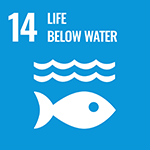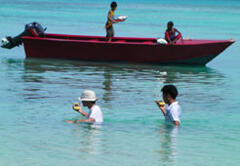Eco-technological Management of Tuvalu against Sea Level Rise
Principal Investigator
ODA Recipient Country
Tuvalu
Research Institutions in Japan
The University of Tokyo / National Institute for Environmental Studies (NIES) / Ibaraki University / University of the Ryukyus
Research Institutions in Counterpart Country
Tuvalu’s Department of Environment / Deparment of Fisheries / Department of Lands and Survey
Adoption fiscal year
FY 2008
Research Period
5 Years
Overview of the Research Project
Rise in sea level and loss of creatures that produce sand
Tuvalu is at risk of submerging due to rising sea levels caused by the effects of climate change. The natural environment has been degraded by population increase and economic development, resulting in progressive deterioration of the coral reefs and a drop in the capacity of the ecosystem that creates the deposits that constitute Tuvalu’s native soil. As a result, there is a need to understand the mechanism that forms and maintains the island and consider the ecosystem, and then devise policies to increase the island’s restorative capabilities. These policies can be applied not only to Tuvalu but to atolls throughout the world, and to the islands off the coast of the Japanese mainland.
Development of technologies to aid coral and foraminifera propagation
A study of the topography, ecosystem etc. of Funafuti Atoll was conducted, and a map was prepared showing the distribution of coral and foraminifera and the production, transportation and sedimentation of sand by these organisms. In addition, experiments to raise and propagate foraminifera were conducted successfully. This study will aid in efforts to maintain the national territory while restoring the ecosystem, and in formulating measures to combat coastal erosion and coastal management plans.
Photo gallery
Research Project Web site
Press Release
Links
Projects
Contact Us
Japan Science and Technology Agency (JST)
Department of International Affairs
SATREPS Group
TEL : +81-3-5214-8085
Related articles by Category
- Climate Change
Environment / Energy
(Climate Change)
 Federative Republic of Brazil
Federative Republic of Brazil
Health Checkup for the World’s Lungs: Measuring the Carbon Stocks in the Amazon Forests
Carbon Dynamics of Amazonian Forests
- Oceania
Disaster Prevention and Mitigation

 Kingdom of Tonga
Kingdom of Tonga
Volcanic island nations working together to reduce the risk of eruption and tsunami disasters!
Disaster Risk Reduction of Widespread Volcanic Hazards in Southwest Pacific Countries
- SDGs : Goal.13
Environment / Energy
(Carbon Neutrality)
 Kingdom of Cambodia
Kingdom of Cambodia
Using water management to reduce methane emissions from rice paddies!
Development and Social Implementation of Greenhouse Gas Emission Reduction Technologies in Paddy Fields of West Tonle Sap Lake by Establishing a Large Paddy Area Water Management System






 Tuvalu
Tuvalu














